Table of Contents
- Introduction to Smart Pills
- Key Smart Pills Statistics
- Types of Smart Pills and Their Benefits
- Adoption and General Statistics
- Smart Pills and Health
- Advancements in Smart Pills Technology
- Key Players in Smart Pills Statistics
- Challenges in Smart Pills Technology Statistics
- Recent Developments
- Conclusion
- FAQs
Smart Pills Statistics: The integration of technology with healthcare has brought about paradigm shifts in disease diagnosis and treatment.
One such revolutionary concept is the advent of smart pills, miniaturized, ingestible medical devices that provide unparalleled insights into the human body’s system functioning.
This comprehensive examination of smart pills seeks to provide an overview of their types, significance, current adoption rates, market size, the role of AI, challenges faced, and prospects.
Introduction to Smart Pills
Smart pills are a class of digital health tools, typically composed of ingestible sensors, cameras, and trackers. They are designed to navigate through the human digestive tract, providing real-time, detailed information on the gastrointestinal tract’s health and other physiological parameters.
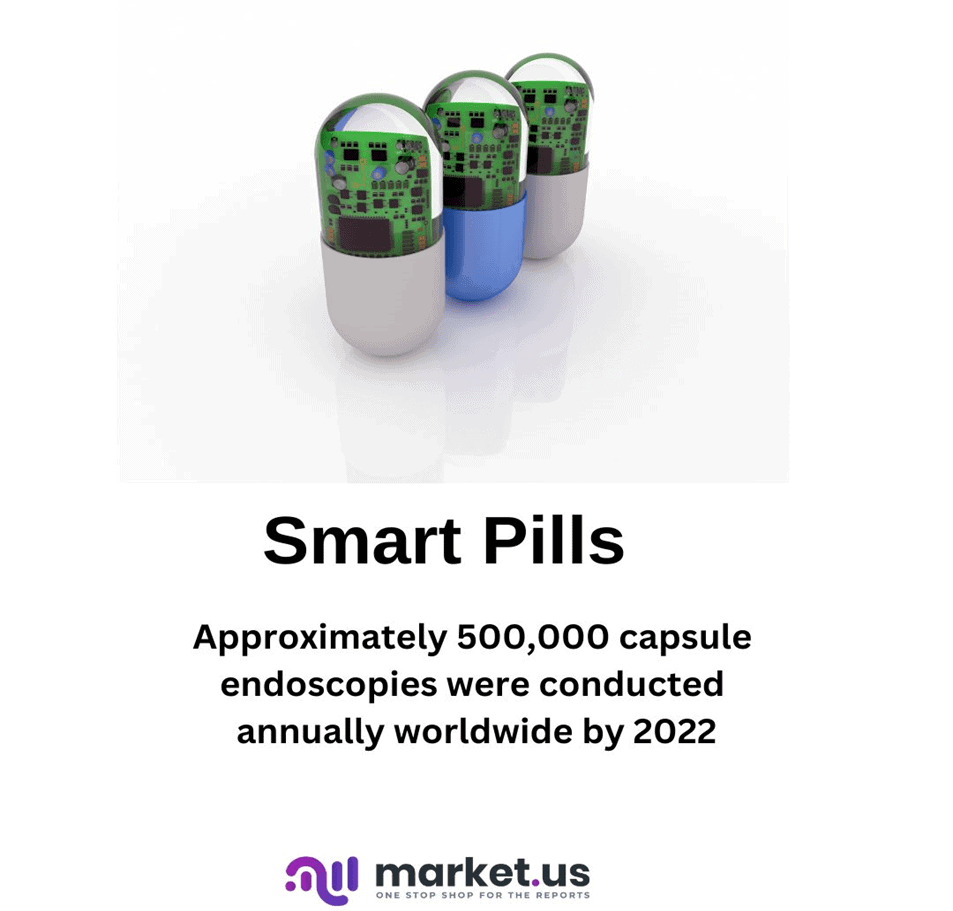
Key Smart Pills Statistics
- In 2022, the Smart Healthcare Market was valued at USD 184 billion and is expected to reach around 541 billion in 2032. Between 2023 and 2032, this market is estimated to register a CAGR of 15.7%.
- The Global Smart Pills Market Size is expected to be worth around US$ 3.5 Billion by 2034, from US$ 1.2 Billion in 2024, growing at a CAGR of 11.2% during the forecast period from 2025 to 2034.
- Approximately 500,000 capsule endoscopies will be conducted annually worldwide by 2022.
- Around 50% of patients do not take their medications as prescribed, a challenge that smart pills could address.
- A survey conducted in 2022 showed that 67% of healthcare professionals agreed that smart pills could improve patient outcomes, and about 45% had already started using smart pills in their practice.
- Around 78% of surveyed patients reported they would feel comfortable ingesting a smart pill if prescribed.
- An AI algorithm could predict the development of inflammatory bowel disease in 86% of cases by analyzing data from smart pills.
- The United States is dominant in the global smart pills market with the largest market share.
(Source: NIH)
Types of Smart Pills and Their Benefits
There are primarily two types of smart pills: diagnostic and therapeutic.
Cognitive Enhancing Pills (Nootropics)
- A study conducted in the US and Germany indicated that around 30% of respondents used cognitive enhancers at least once, while about 15% used them regularly.
- The typical users of these substances tend to be male, usually aged between 25 and 45.
- 17-20% of college students may use prescription drugs as cognitive enhancers.
- A 2018 review in the journal “European Neuro-Psychopharmacology” noted that among college students in the US. Self-reported use of prescription stimulants (which can have nootropic effects) was estimated at 17%.
- A study in Germany estimated the lifetime prevalence of the use of prescription drugs for cognitive enhancement at about 20%.
(Source: NIH)
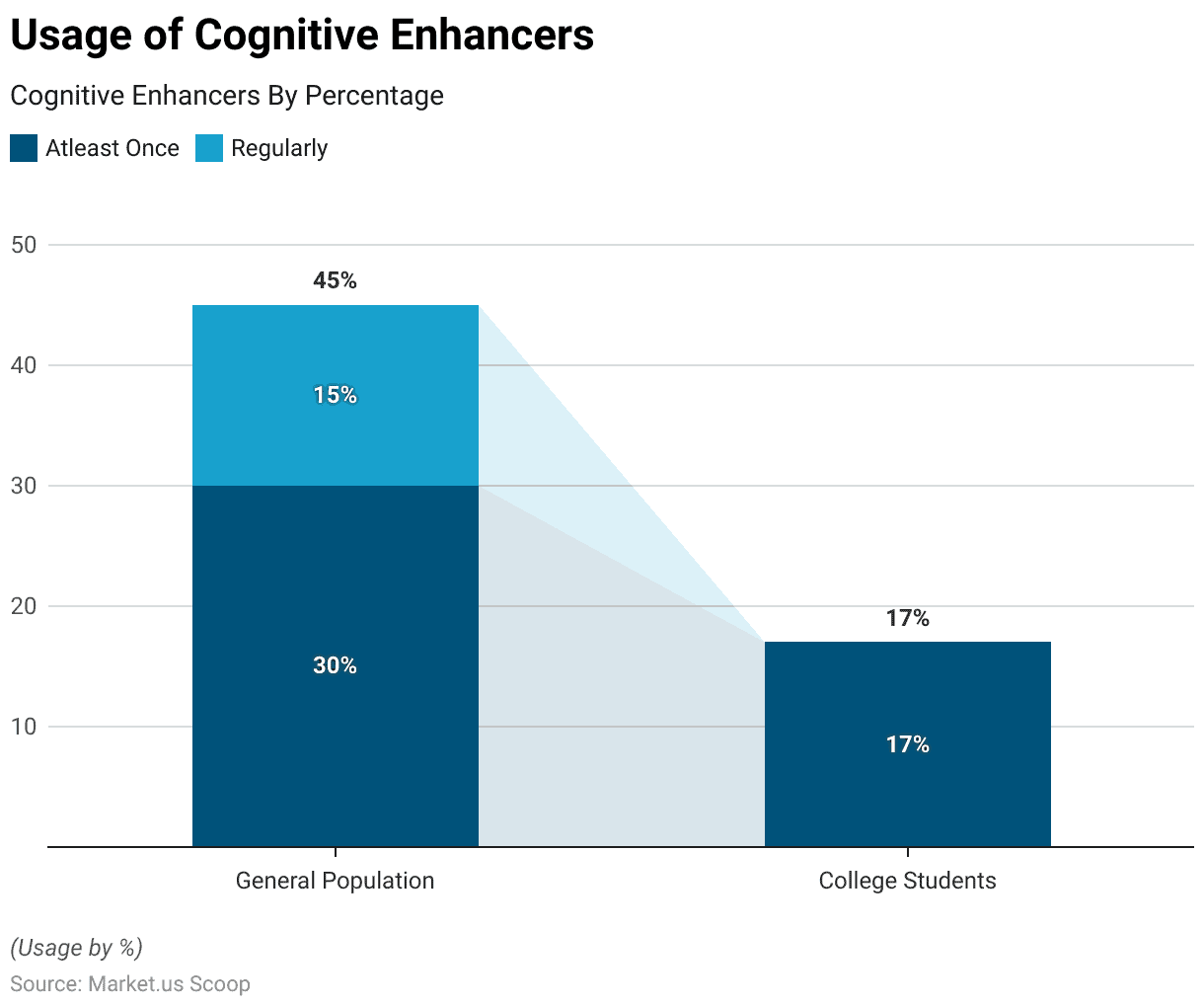
Diagnostic and Therapeutic Smart Pills Statistics
- Diagnostic smart pills include capsule endoscopy and patient health monitoring systems. Capsule endoscopy smart pills, equipped with tiny cameras, capture images of the gastrointestinal tract for non-invasive diagnosis. By 2022, about 500,000 capsule endoscopies will be conducted annually worldwide.
- Therapeutic smart pills deliver targeted medication to specific locations within the body, improving drug effectiveness and reducing side effects. They can enhance treatment adherence, which is a substantial challenge. Considering that around 50% of patients do not take their medications as prescribed.
Adoption and General Statistics
- A survey published in Drug Delivery Letters in 2022 indicated that around 78% of patients surveyed would feel comfortable ingesting a smart pill if prescribed by their healthcare provider.
- A separate study focused on the elderly, a demographic particularly prone to chronic diseases, found that 73% of participants were open to using smart pills for health monitoring and medication management.
- A study published in the Journal of Medical Internet Research found that smart pills improved medication adherence by up to 15%.
- About 78% of patients said they would feel comfortable ingesting a smart pill if prescribed, suggesting high patient acceptance.
- By 2022, approximately 500,000 capsule endoscopies were conducted annually worldwide, reflecting the growing use of diagnostic smart pills.
- A study by the University of California showed that an AI algorithm could predict inflammatory bowel disease development in 86% of cases using data from smart pills.
(Source: Bentham Science, journals)
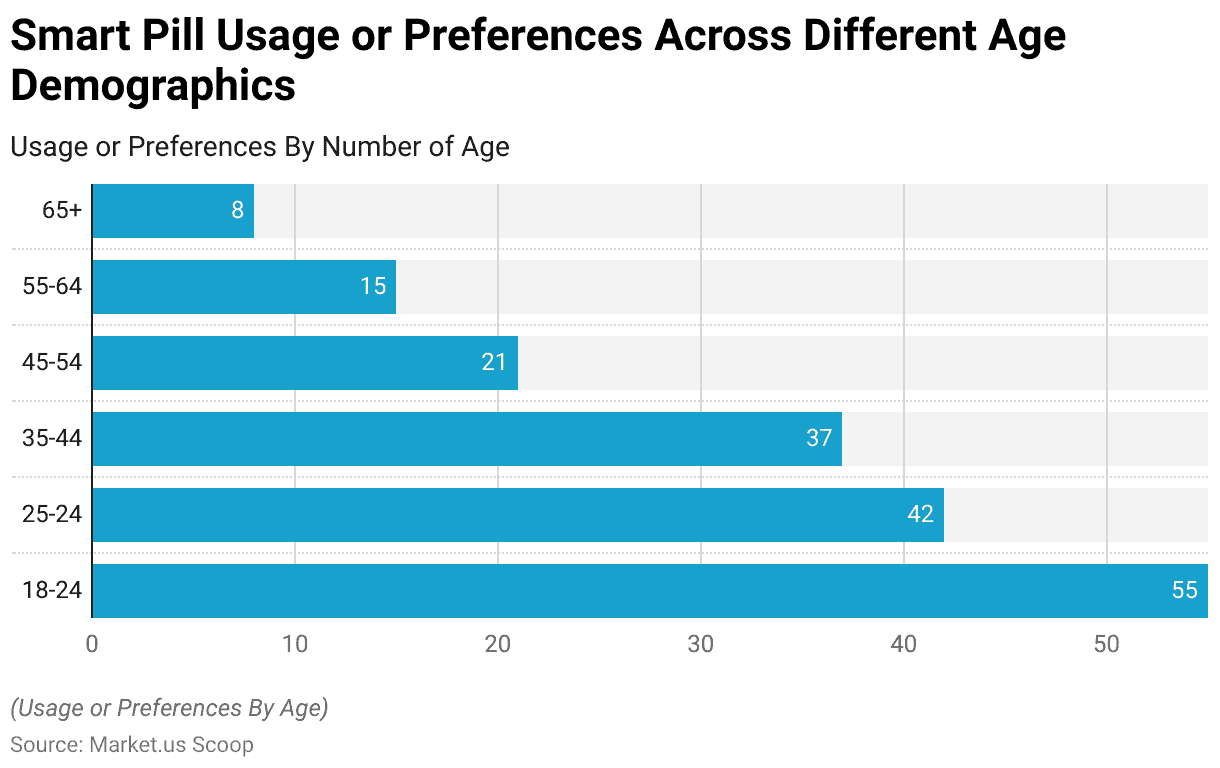
Smart Pills and Health
Potential Side Effects and Risks
- Physical Side Effects of Smart Pills: Some users of smart pills report physical side effects, including headaches, nausea, restlessness, and insomnia, and in rare instances, rapid heart rate or high blood pressure.
- Mental Side Effects: Smart pills may also have mental side effects that include anxiety, mood swings, and irritability, in rare instances. This could even progress to more serious psychiatric disorders.
- Dependence and Addiction: Some medications commonly known as smart pills carry the risk of dependence and addiction. Particularly stimulant medicines that are sometimes taken off-label for cognitive enhancement purposes.
- Overdose: Without proper medical supervision, smart pills pose the potential risk of overdosage, which could have serious repercussions, even leading to death.
- Interactions with Other Medications: Smart pills may interact with other medicines, potentially leading to dangerous combinations.
- Unknown Long-term Effects: Unfortunately, due to limited research into off-label uses of smart pills and their long-term effects being unknown.
Long-term Impact Studies
- Modafinil: was initially developed to treat narcolepsy and other sleep disorders. However, research suggests it can also enhance attention and executive functions in some studies. Notably, its benefits may be particularly noticeable among individuals with lower baseline cognitive performance.
- Methylphenidate (Ritalin): Methylphenidate is used to treat ADHD and has been proven to increase attention spans while suppressing impulsive behaviors in its patients. For healthy adults, however, its effects are less clear-cut. Some studies report modest benefits while others observe no observable results at all.
- Adderall (Amphetamines): Like Ritalin, Adderall can also be used to treat ADHD patients and is known to improve attention and manage impulsive behavior. Its effect on healthy adults, however, remains less certain and can vary widely.
- Piracetam and related racetams: Piracetam is among the most widely used nootropics, and research suggests it can improve memory and other cognitive functions. Especially among older individuals or those suffering from cognitive impairment. Their effects may not be as apparent among healthy adults.
- Caffeine: Caffeine is an effective stimulant that can boost alertness and concentration. However, overuse may lead to tolerance, leading to withdrawal symptoms like fatigue and decreased cognitive performance.
Advancements in Smart Pills Technology
- Miniaturization: Recent advances in smart pill technology have focused on miniaturizing pills to make them smaller and simpler for patients to swallow. Providing increased patient comfort and compliance.
- Sensors and Tracking: Smart pills now feature sensors designed to measure various physiological parameters inside of our bodies, including pH levels. Temperature fluctuations, drug release patterns, and patient response patterns. These sensors offer valuable insight into drug efficacy and patient response.
- Wireless Communication: Recently, advances have been made that enable smart pills to wirelessly transmit data to external devices and help healthcare providers monitor patient adherence. Drug effectiveness and other pertinent data in real time. Drug Delivery Systems: Researchers are exploring smart pills with advanced drug delivery systems that release medications precisely at specific points within the digestive tract or even target specific cells or tissues – increasing drug efficacy while simultaneously decreasing side effects.
- Integration with Wearable Devices: Smart pill technology can be combined with wearable devices such as smartwatches or patches for enhanced data collection and analysis. Providing a deeper insight into patient health and medication response.
- Artificial Intelligence (AI) Integration: Artificial intelligence is being explored as part of smart pill technology to analyze collected data and offer personalized insights and recommendations. AI algorithms can detect patterns, spot trends, and help healthcare providers make informed decisions.
Key Players in Smart Pills Statistics
Medtronic plc
- Medtronic, a global medical technology company, manufactures an assortment of smart pill technologies for gastrointestinal imaging. One such smart pill technology used by Medtronic is the PillCam capsule endoscopy system.
- In May, Medtronic acquired a 100% stake in Intersect ENT for US$1.1 billion.
- Medtronic’s revenue has risen from 11.3 billion U.S. Dollars in 2006 to more than 31 million U.S. Dollars in 2021.
(Source: market.us)
Proteus Digital Health
- Proteus Digital Health specializes in digital medicine solutions, including smart pills. Their Proteus Discover system uses ingestible sensors, wearable patches, and smartphone apps to monitor medication adherence while offering personalized insights for both patients and healthcare providers.
- Proteus Digital Health has raised a total of $492M in funding over 12 rounds. Their latest funding was raised on Nov 30, 2019, from a Venture – Series Unknown round.
- Proteus Digital Health has developed a smart pill system called “Proteus Discover.” The Proteus Discover system combines an ingestible sensor, a wearable patch, and a smartphone app to monitor medication adherence and provide personalized insights to patients and healthcare providers.
(Source: Crunchbase)
Otsuka Pharmaceutical Co. Ltd.
- Otsuka Pharmaceutical, a Japanese pharmaceutical company, has created Abilify MyCite – an FDA-approved smart pill system. Abilify MyCite can be used for the treatment of certain mental health conditions and contains a sensor to track medication ingestion.
- The net sales of Otsuka Holdings Co., Ltd. in the fiscal year 2021 amounted to about 1.5 trillion Japanese yen, up from around 1.4 trillion yen in the previous year.
- Otsuka Holdings is a holding company of many group companies worldwide such as Otsuka Pharmaceutical Co., Ltd., Taiho Pharmaceutical Co., Ltd., and Otsuka Chemical.
(Source: Statista)
CapsoVision Inc.
- CapsoVision is a medical device company specializing in capsule endoscopy technology development. Specifically with their product CapsoCam Plus which is an imager providing high-resolution images of the small intestine.
- CapsoVision has 68 employees, and the revenue-per-employee ratio is $31,764. CapsoVision’s peak revenue was $2.2M in 2022.
(Source: Zippia)
Market Share of Smart Pills Key Players Statistics
- Medtronic Plc. is the leading company in the global smart pills market with the largest market share of 30% followed by Proteus Digital Health’s market share of 20%.
(Source: Statista)
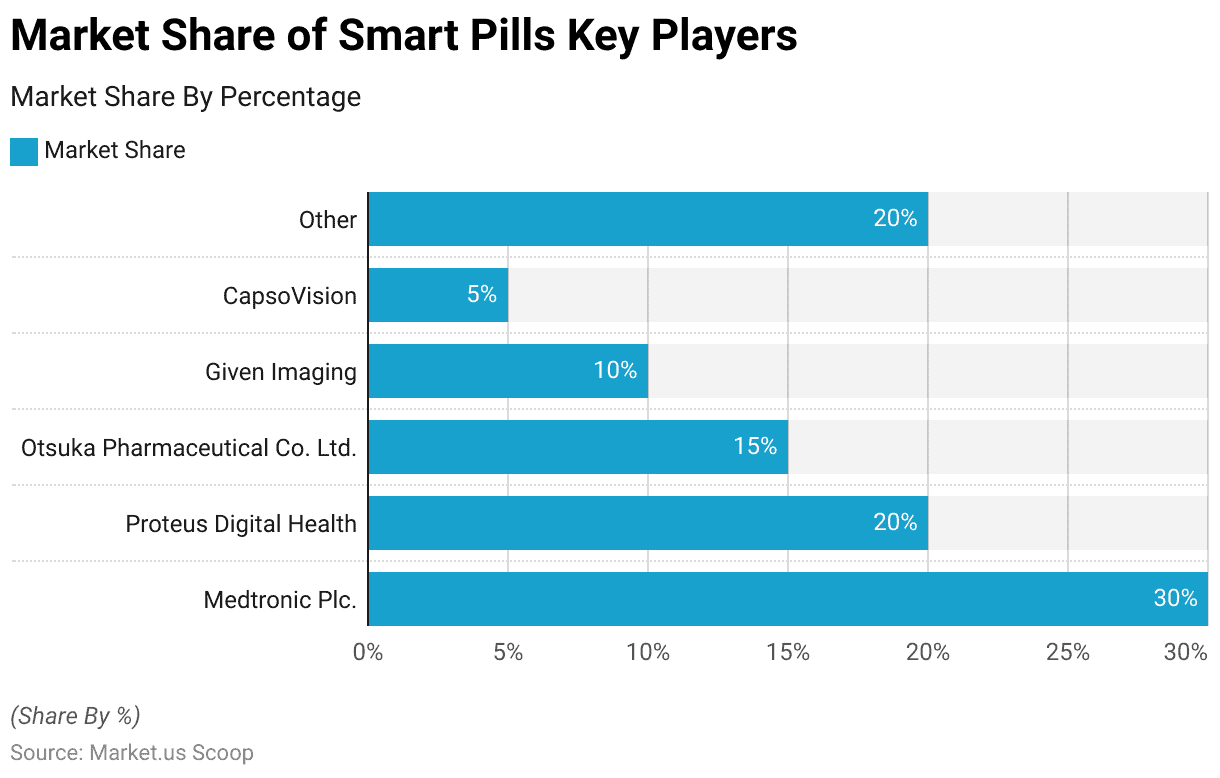
Challenges in Smart Pills Technology Statistics
- Privacy and Data Security: Smart pills collect sensitive health data, so ensuring their privacy and security are of utmost importance. Preventing unauthorized access while also upholding data integrity is a major challenge facing medical providers today.
- Approval Process: Smart pills must comply with strict regulatory oversight. Receiving approval from regulatory authorities may be a long and tedious process. Meeting safety, efficacy and quality standards set by regulators is paramount, yet meeting them may present many difficulties.
- Patient Acceptance and Adoption: For smart pills to succeed, patient acceptance and adoption are crucial. Addressing potential concerns regarding the ingestion of electronic devices, privacy considerations, and possible side effects may prove challenging.
- Technical Reliability: Smart pills rely on various technologies, including sensors, wireless communication, and data processing. Ensuring their reliability and accuracy as well as mitigating technical issues or failures remains an ongoing challenge.
- Cost: The costs associated with developing and manufacturing smart pills can be significant. Making them unaffordable and inaccessible to patients and healthcare systems alike. Finding cost-cutting production methods and affordable solutions is therefore paramount in meeting this challenge head-on.
- Integrating Smart Pill Technology into Healthcare Systems: Integrating smart pill technology into existing healthcare systems and workflows is not without difficulty. Requires careful planning and coordination between all parties involved to ensure smooth data exchange. Interoperability with electronic health records (EHRs), and integration into healthcare professionals’ workflow.
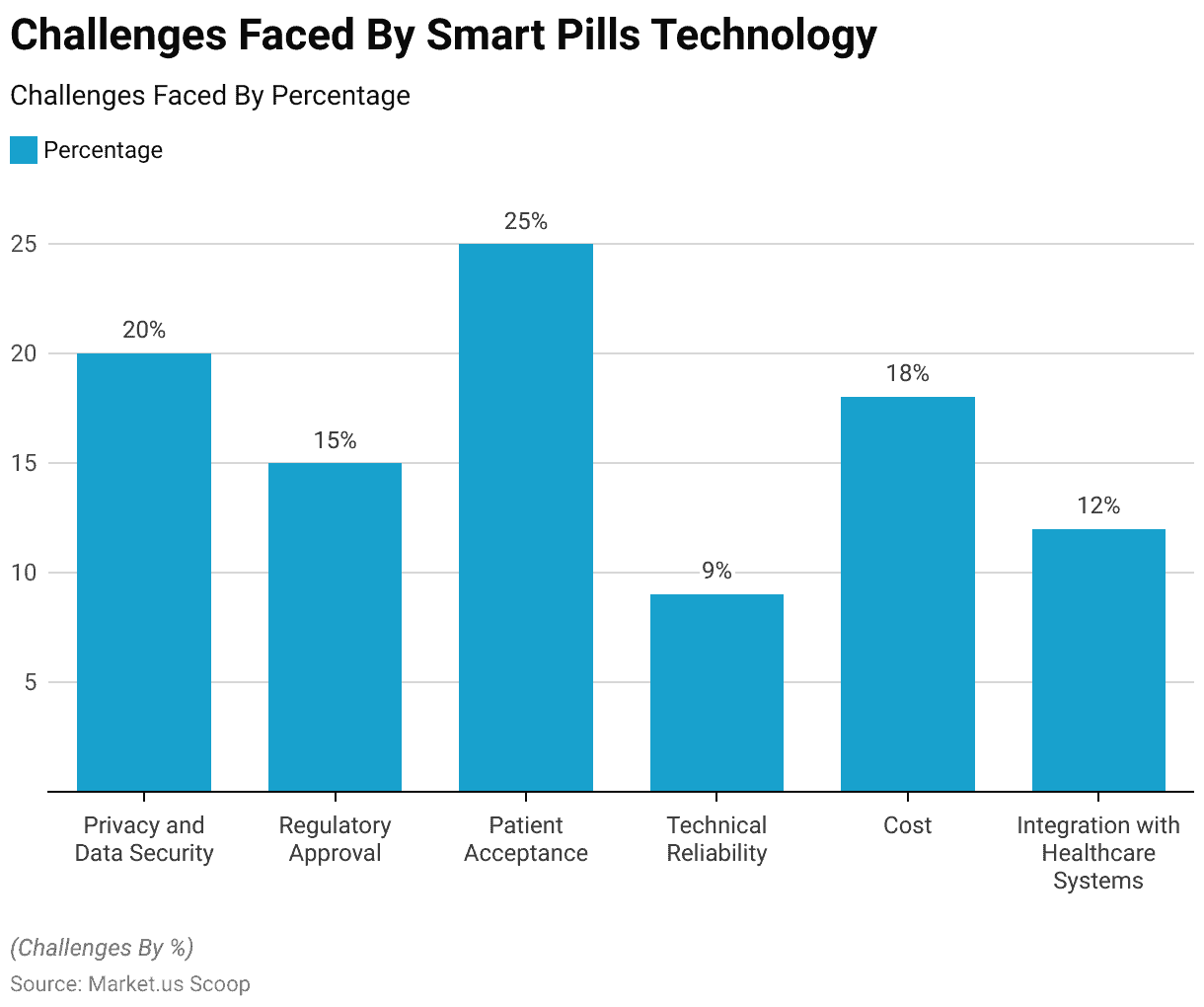
Recent Developments
Acquisitions and Mergers:
- Medtronic acquires Digital Diagnostics: In early 2024, Medtronic acquired Digital Diagnostics, a company specializing in AI-driven smart pill technologies. This acquisition aims to enhance Medtronic’s portfolio in digital health and smart pill innovations.
- Boston Scientific merges with Proteus Digital Health – In a strategic move to expand its digital health solutions. Boston Scientific completed a merger with Proteus Digital Health. A pioneer in smart pill technology in mid-2023.
New Product Launches:
- ePill Medication Reminders: ePill launched a new line of smart pills in 2023 designed to monitor patient adherence to medication regimens. These pills come with integrated sensors that send data to a mobile app, allowing healthcare providers to track compliance in real time.
- Capsule Technologies’ Smart Capsule: Capsule Technologies introduced its latest smart pill in late 2023. Equipped with advanced sensors to monitor gastrointestinal health and deliver medication precisely when needed.
Funding:
- Proteus Digital Health secures $200 million: In 2023, Proteus Digital Health raised $200 million in a funding round led by top venture capital firms to further develop its smart pill technology and expand its market reach.
- HQ3 Smart Pills raises $150 million: HQ3 Smart Pills, a startup specializing in ingestible sensors for medication monitoring. Secured $150 million in Series B funding in early 2024 to accelerate its product development and commercialize its solutions.
Technological Advancements:
- Integration of AI and IoT: Smart pills are increasingly incorporating AI and IoT technologies to enhance data accuracy and provide real-time health monitoring. These advancements enable better patient management and personalized treatment plans.
- Biodegradable Sensors: Recent developments in biodegradable sensor technology are making smart pills safer and more sustainable, as they can dissolve harmlessly in the body after use.
Regulatory Approvals:
- FDA approval for Abilify MyCite: In 2023, the FDA approved Abilify MyCite, a smart pill developed by Otsuka Pharmaceutical and Proteus Digital Health. For tracking the ingestion of the antipsychotic medication aripiprazole.
- CE Mark for Smart Ingestible Capsules: Several European companies received CE Mark approval in 2023 for their smart ingestible capsules designed for diagnostic and therapeutic purposes. Paving the way for broader market adoption in the EU.
Market Trends:
- Growing Adoption in Chronic Disease Management: The use of smart pills is rapidly growing in the management of chronic diseases like diabetes, hypertension, and cardiovascular conditions, as these devices help ensure medication adherence and provide valuable health data.
- Increased Demand for Remote Monitoring: With the rise of telehealth, there is an increasing demand for smart pills that facilitate remote patient monitoring, reducing the need for frequent hospital visits and enabling continuous health tracking.
Conclusion
Smart Pills Statistics – According to smart pills statistics, smart pills have emerged as a transformative technology in healthcare. Offering significant potential for diagnosis, treatment, and patient monitoring.
Advancements in technology such as miniaturization, sensors and tracking, wireless communication, integration with wearable devices, and AI integration, have further enhanced the capabilities and effectiveness of smart pills.
Furthermore, technology is facing several challenges in privacy and data security, regulatory approval, patient acceptance, technical reliability, cost, and integration with healthcare systems.
With ongoing research and advancements, smart pills have the potential to revolutionize healthcare by providing valuable insights, improving medication adherence, and enhancing patient outcomes.
FAQs
Smart pills are miniaturized, ingestible medical devices that contain sensors, cameras, and trackers. They are designed to navigate through the digestive tract and provide real-time information about the body’s physiological parameters.
Smart pills offer several benefits, including non-invasive diagnosis through capsule endoscopy, targeted drug delivery for enhanced efficacy and reduced side effects, improved medication adherence, and real-time monitoring of patient health. They provide valuable data to healthcare providers, enabling personalized treatment and better patient outcomes.
Certain smart pills, such as the Abilify MyCite system for mental health treatment, have received FDA approval.
AI integration is an area of exploration in smart pill technology. AI algorithms can analyze data collected by smart pills, detect patterns, and provide personalized insights and recommendations.


